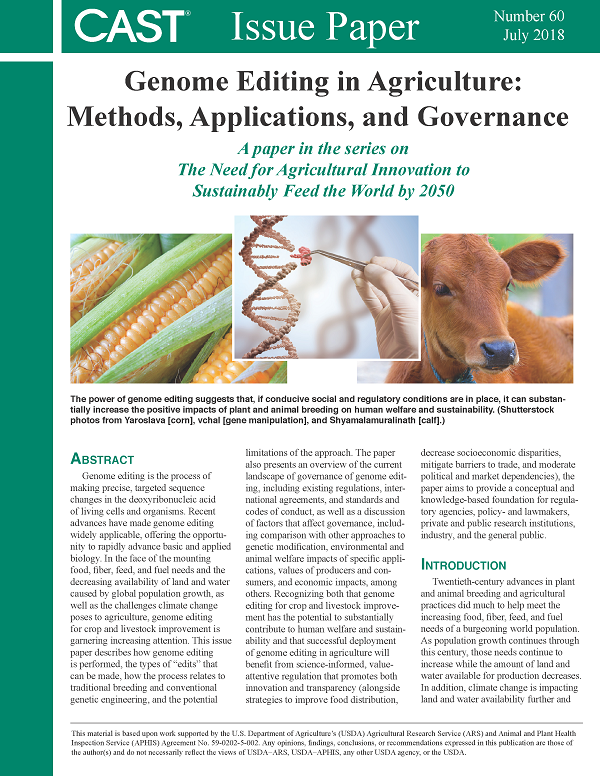
PRESS RELEASE
July 9, 2018 | Council for Agricultural Science and Technology, Ames, Iowa
Twentieth-century advances in plant and animal breeding did much to help meet the increasing food, fiber, feed, and fuel needs of an expanding world. But continued population growth, resource shortages, climate change, and pest prevalence make sustainability a daunting yet essential task. Genome editing is a powerful new method that enables unprecedented control over genetic material and offers the opportunity to make rapid advances that influence agricultural practices.
Led by Task Force Chair Adam J. Bogdanove, the authors of this issue paper focused their attention on a tool that can increase the positive impacts of plant and animal breeding on human welfare and sustainability. Genome editing is a process used to make precisely targeted changes in the DNA (deoxyribonucleic acid) of living cells and organisms. Due to recent advances, this method is widely applicable and offers the opportunity to rapidly advance basic and applied biology.
This issue paper addresses the concept by explaining:
- how genome editing is performed,
- what types of edits can be made,
- how the process relates to traditional breeding and other means of genetic modification,
- what potential limitations may arise with this approach, and
- what current factors affect the governance of gene editing
From abstract: “… the paper aims to provide a conceptual and knowledge-based foundation for regulatory agencies, policy and lawmakers, private and public research institutions, industry, and the general public.”
Although much remains to be learned, it is clear that successful development of genome editing for crop and livestock improvement will benefit from science-informed, value-attentive regulation that promotes both innovation and transparency. The authors of this paper intended for it to be a resource in providing a conceptual and knowledge-based foundation for regulatory agencies, policymakers, private and public research institutions, industry, and the general public.
This CAST Issue Paper (IP 60) and its companion Ag quickCAST are available online at the CAST website, along with many of CAST’s other scientific publications. CAST Issue Papers, Commentaries, and Ag quickCASTs are FREE.
Contacts:
Adam Bogdanove-Phone: 607-255-7831; Email: ajb7@cornell.edu
Kent Schescke-Phone: 515-292-2125, ext. 231; Email: kschescke@cast-science.org
Task Force Authors:
- Adam J. Bogdanove (Chair), Cornell University
- David M. Donovan, USDA-ARS/NEA (retired)
- Estefania Elorriaga, Oregon State University
- Jennifer Kuzma, North Carolina State University
- Katia Pauwels, Sciensano
- Steven H. Strauus, Oregon State University
- Daniel F. Voytas, University of Minnesota
Note to editors: An abstract of the paper follows.
Title: Genome Editing in Agriculture: Methods, Applications, and Governance – A paper in the series on The Need for Agricultural Innovation to Sustainably Feed the World by 2050
Authors: Adam J. Bogdanove, David M. Donovan, Estefania Elorriaga, Jennifer Kuzma, Katia Pauwels, Steven H. Stauus, Daniel F. Voytas
Published: July 9, 2018, by Council for Agricultural Science and Technology (CAST), Issue Paper 60. CAST, Ames, Iowa
Abstract:
Genome editing is the process of making precise, targeted sequence changes in the deoxyribonucleic acid of living cells and organisms. Recent advances have made genome editing widely applicable, offering the opportunity to rapidly advance basic and applied biology. In the face of the mounting food, fiber, feed, and fuel needs and the decreasing availability of land and water caused by global population growth, as well as the challenges climate change poses to agriculture, genome editing for crop and livestock improvement is garnering increasing attention. This issue paper describes how genome editing is performed, the types of “edits” that can be made, how the process relates to traditional breeding and conventional genetic engineering, and the potential limitations of the approach. The paper also presents an overview of the current landscape of governance of genome editing, including existing regulations, international agreements, and standards and codes of conduct, as well as a discussion of factors that affect governance, including comparison with other approaches to genetic modification, environmental and animal welfare impacts of specific applications, values of producers and consumers, and economic impacts, among others. Recognizing both that genome editing for crop and livestock improvement has the potential to substantially contribute to human welfare and sustainability and that successful deployment of genome editing in agriculture will benefit from science-informed, value-attentive regulation that promotes both innovation and transparency (alongside strategies to improve food distribution, decrease socioeconomic disparities, mitigate barriers to trade, and moderate political and market dependencies), the paper aims to provide a conceptual and knowledge-based foundation for regulatory agencies, policy and lawmakers, private and public research institutions, industry, and the general public.
A version of this press release was originally published at cast-science.org
